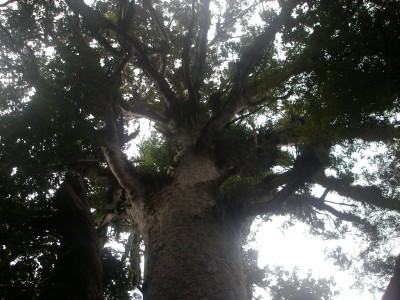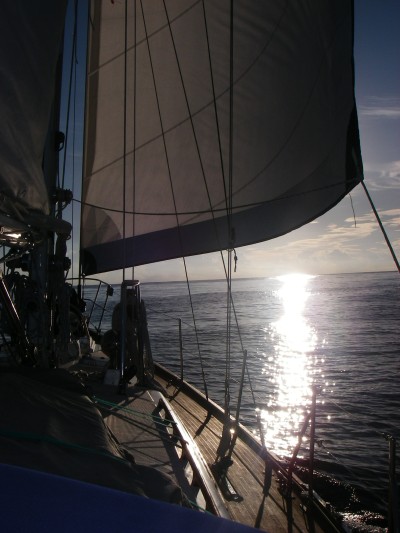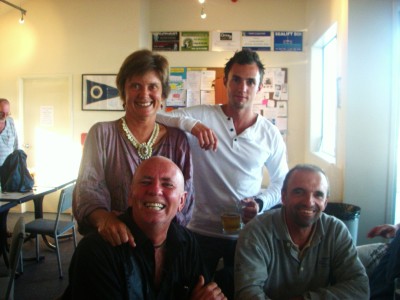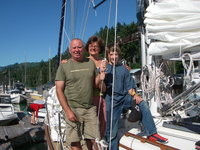
Hannah
12 February 2009 | Whangarei, New Zealand
26 November 2008 | NZ
26 November 2008 | Opua, New Zealand
24 November 2008 | Opua, New Zealand
21 November 2008 | NNE of New Zealand
18 November 2008 | Minerva Reef
17 November 2008 | Minerva Reef Yacht Club
17 November 2008 | Minerva Reef
14 November 2008 | Minerva Reef
12 November 2008 | Nuku'alofa, Tonga
10 November 2008 | Nuku'alofa, Tonga
31 October 2008 | Kelefesia Island
21 October 2008 | Neiafu, Va'vau
11 October 2008 | Neiafu, Va'vau, Tonga
07 October 2008 | Niuatoputapu
23 September 2008 | Niuatoputapu (
19 September 2008 | Apia, Samoa
17 August 2008 | Apia, Samoa
03 August 2008 | Pago Pago, American Samoa
03 August 2008 | Pago Pago, American Samoa
What Are We Doing?
12 February 2009 | Whangarei, New Zealand
Tracy

A man named Gerry McNamara who was aboard the US Air flight 1549 that landed on the Hudson River wrote (and I paraphrase) that his take home lessons were 1) Cherish you families as never before and go to great lengths to keep your promises, 2) Be thankful for everything you have and don't worry about the things you don't have, 3) Keep in shape..you never know, and 4) Wear practical clothing.
I have been avoiding writing because so much has happened and so much is unclear, and I keep feeling the need to pen "Everything I Need to Know I Learned Going Ashore in the Dinghy".
Hannah and her boat pals laze idly in the green of the placid Whangarei River, tied to pilings or double-rafted to the dock, looking more like animals in a barn than sea-going creatures. They become almost floating RVs. No one goes anywhere except a few bends down the river to haul out, and we can barely feel any rocking unless it is windy. I close my eyes and remember being at sea in this pulsing, breathing being of a boat. We ourselves are also less salty, restaurant-fed, and filled with terrestrial sensations.
New Zealand has proved unexpectedly captivating. We have both known people who migrated here but returned shortly to the US, tired of the weather or a certain reticence in people. It is hard to begin to name what has caught us...the extraordinary helpfulness of everyday people...the always near, often empty beaches..the surf breaks where you undo an electric fence and cross a muddy pond on a farm to get there..the first-class medical care..the well-maintained two land roads and one-way bridges that cover the country (except for lots of dirt roads)..the nuanced political process of moving forward in the Treaty of Waitangi settlement process, dealing with Pakeha (descendants of white immigrants) and Maori relationships and sovereignty...the vast, unsubsidized farms...the robustness of the food in the Saturday market...the sense that personal judgment and responsibility are not faulty lost causes...the beauty of the kauri and totara trees and ferns... We dream about someday in the future being here again.
In December Steve and I flew back to the United States to see family and friends in a whirlwind tour, picking Nolan up at school and proceeding to LA, Bozeman, West Yellowstone, Thermopolis, Livingston, Billings, Boston, Harwich, Seattle, Dee, Los Olivos, LA, Sydney, and Auckland. To see everyone was universally delightful. I was still there for the inauguration and packed into Seattle Town Hall in the morning to see history. The one piece that the reporting I saw missed was the worldwide celebration. People from an Australian holiday park owner to a Iranian who is a senior adviser in the Kiwi government tear up a bit when they say how grateful they are for an Obama presidency. We found that the US, in spite of the fact that we passed through some most beautiful places, often made our eyes hurt. Unlike the shock to one's system after returning from a poor country to a rich country, this was about returning from the out-of-doors to that particular constructed world. And in the US, life is often a commercial event, unthoughtfully planned, driven by mindless avarice, content with the delusion of being "the best in the world".
That said, we are going home, to a home. Nolan is just in his first year of high school and I want to make a non-mobile, non-floating home for him to come to and to be able to participate in his life at school. Everybody asks if there is not some other way, involving cruising part-time, cleverly dashing back and forth on planes for school holidays, etc. The answer we have come to after trying extraordinarily hard, is no. For one year, yes, but not for the next three. So Hannah is on the market, the broker's big "For Sale" sign making our hearts ache. We are looking for work and a quiet rural place to live in the western US.
So here it goes...
1) Anyplace is improved by arrival by sea rather than by land. Be it reeking of tuna guts or fragrant with fruit and flowers, whether one has come across an ocean or just a bay, arrival by sea recapitulates humankind finding a port in the storm. Every single time, one comes home. Even if one has never been to a place before. And the people who live by the sea already know the people who come from the sea, no matter what their differences of class or nationality.
2) The Maori concept of balanced interdependence between people and land is true, however easily it may be forgotten in a shower of annual audits, alarm clocks, pollution, too busyness, scheduled get-togethers, and oblivious complexity. The Maori word "whenua" means land and placenta. It is in our bones now. It is not about mere stewardship.
3) Setting sail is compelling, sailing home invokes uncertainly and ambivalence and greater challenges, once one has been out. Only after sailing so far was I able to savor reading Homer's Odyssey. The author Norman Fischer analyzed the drama of Odysseus and his son Telemachus in ousting the suitors in Ithaca: for "the force necessary to purify and occupy our own house...the wisdom and craft of age need the innocence and desire of youth to be effective". We hope we don't forget. We are not finished with sailing: the RC Louise, our beloved 32' Rhodes Chesapeake, awaits our return and will be sure to keep us "setting sail" and thus allowing us to return home.
I have been avoiding writing because so much has happened and so much is unclear, and I keep feeling the need to pen "Everything I Need to Know I Learned Going Ashore in the Dinghy".
Hannah and her boat pals laze idly in the green of the placid Whangarei River, tied to pilings or double-rafted to the dock, looking more like animals in a barn than sea-going creatures. They become almost floating RVs. No one goes anywhere except a few bends down the river to haul out, and we can barely feel any rocking unless it is windy. I close my eyes and remember being at sea in this pulsing, breathing being of a boat. We ourselves are also less salty, restaurant-fed, and filled with terrestrial sensations.
New Zealand has proved unexpectedly captivating. We have both known people who migrated here but returned shortly to the US, tired of the weather or a certain reticence in people. It is hard to begin to name what has caught us...the extraordinary helpfulness of everyday people...the always near, often empty beaches..the surf breaks where you undo an electric fence and cross a muddy pond on a farm to get there..the first-class medical care..the well-maintained two land roads and one-way bridges that cover the country (except for lots of dirt roads)..the nuanced political process of moving forward in the Treaty of Waitangi settlement process, dealing with Pakeha (descendants of white immigrants) and Maori relationships and sovereignty...the vast, unsubsidized farms...the robustness of the food in the Saturday market...the sense that personal judgment and responsibility are not faulty lost causes...the beauty of the kauri and totara trees and ferns... We dream about someday in the future being here again.
In December Steve and I flew back to the United States to see family and friends in a whirlwind tour, picking Nolan up at school and proceeding to LA, Bozeman, West Yellowstone, Thermopolis, Livingston, Billings, Boston, Harwich, Seattle, Dee, Los Olivos, LA, Sydney, and Auckland. To see everyone was universally delightful. I was still there for the inauguration and packed into Seattle Town Hall in the morning to see history. The one piece that the reporting I saw missed was the worldwide celebration. People from an Australian holiday park owner to a Iranian who is a senior adviser in the Kiwi government tear up a bit when they say how grateful they are for an Obama presidency. We found that the US, in spite of the fact that we passed through some most beautiful places, often made our eyes hurt. Unlike the shock to one's system after returning from a poor country to a rich country, this was about returning from the out-of-doors to that particular constructed world. And in the US, life is often a commercial event, unthoughtfully planned, driven by mindless avarice, content with the delusion of being "the best in the world".
That said, we are going home, to a home. Nolan is just in his first year of high school and I want to make a non-mobile, non-floating home for him to come to and to be able to participate in his life at school. Everybody asks if there is not some other way, involving cruising part-time, cleverly dashing back and forth on planes for school holidays, etc. The answer we have come to after trying extraordinarily hard, is no. For one year, yes, but not for the next three. So Hannah is on the market, the broker's big "For Sale" sign making our hearts ache. We are looking for work and a quiet rural place to live in the western US.
So here it goes...
1) Anyplace is improved by arrival by sea rather than by land. Be it reeking of tuna guts or fragrant with fruit and flowers, whether one has come across an ocean or just a bay, arrival by sea recapitulates humankind finding a port in the storm. Every single time, one comes home. Even if one has never been to a place before. And the people who live by the sea already know the people who come from the sea, no matter what their differences of class or nationality.
2) The Maori concept of balanced interdependence between people and land is true, however easily it may be forgotten in a shower of annual audits, alarm clocks, pollution, too busyness, scheduled get-togethers, and oblivious complexity. The Maori word "whenua" means land and placenta. It is in our bones now. It is not about mere stewardship.
3) Setting sail is compelling, sailing home invokes uncertainly and ambivalence and greater challenges, once one has been out. Only after sailing so far was I able to savor reading Homer's Odyssey. The author Norman Fischer analyzed the drama of Odysseus and his son Telemachus in ousting the suitors in Ithaca: for "the force necessary to purify and occupy our own house...the wisdom and craft of age need the innocence and desire of youth to be effective". We hope we don't forget. We are not finished with sailing: the RC Louise, our beloved 32' Rhodes Chesapeake, awaits our return and will be sure to keep us "setting sail" and thus allowing us to return home.
internet cafe
26 November 2008 | NZ
tracy

slooooooooooowly posting pics, starting with old posts...
The Stories Unfold
26 November 2008 | Opua, New Zealand
Tracy

Turns out the gale, which we familiarly call "our gale", was the biggest one of the year in New Zealand. One cruising club member who gave Steve a ride when he hitched in Paihia said so. Des, a Kiwi weather institution who sounds like Old Father Time on the radio, says he was scared in his house on land. That explains some of the cheering and clapping as we pulled up to the dock. Leaving Minerva Reef, we quickly picked up SE winds on the front of a high pressure and had a brisk, sit on deck and be dry sail for 3 days. Johan, our crew, quickly showed himself to be an 11 on a scale of 1-10 and life was good. We ate well, hearty hot meals three times a day, even if they did include lentils and eggplant and not enough meat for the boys. We had brownies, and kept count of how many each of us ate (witnessed and unwitnessed). Johan hauled in a mahi-mahi, although that did not end the lentil jokes. But we knew the high would move, bringing pleasant easterlies, then northeasterlies...then the cold front and the dreaded low. The forecasts began to include numbers like gusts to 50 kts and seas to 23 feet. Intensive discussion by radio of strategy began among the boats at sea in the area as well as with the weather routers. To follow a rhumb line (shortest distance between two points) or to make westing (traditional advice of Kiwi sailors)? To heave to and wait or to plow on? We poured over weatherfaxes and even downloaded sexy multi-colored gribs to decide. At one point we called Commanders and Dave said they had held a meeting (it wasn't just the sailors but the meteorologists who were pulling their hair) and recommended going for it. So we prepared Hannah well, clearing the decks completely and doing things like tying down the furling headsail and mainsail with extra lines. The cold front moved in with drizzling then driving rain from slate grey, ropey clouds and then the low came. The seas began shooting frothy spume off the crests then breaking here and there. I reminded myself of how friendly gentle ocean swell looks from underwater when snorkeling. Our course, now a rhumb line after westing, was dead down wind, hardest to sail with the Monitor windvane, so we began babysitting it and making corrections. We just had the staysail out, not the storm jib which we probably should have, going with the meteorologists' thoughts that winds would be no more than 40 kts. Before dark, the line that runs the Monitor broke; since we had less than a day to go we knew that handsteering would be best. I took the watch as the sun was setting, now dressed in three layers of pure Pacific Northwest clothes and concerned that I would be hardpressed to steer in the dark. Through my fogged up glasses I could just make out that Steve had written "I love you" on the portlight from the warmth and quiet of our cabin. Johan did not take watch, due to inexperience steering, but made himself incredibly useful by cooking up dinner at "Chez Johan" (that vintage wine sure tasted like Tang to me, though) and bringing up mugs of coffee and snacks (OK, the candy bars floated all over when we got our first genuine "pooping" of the whole trip) and just keeping us company through the night. No one slept much. The seas built to about 5m, not gigantic, but always wild in the dark. Steve steered for the next five hours, fully focused, while I tracked all the freighters and fishing boats that surrounded us as we approached NZ. Just before dawn, things settled. As we came to Bay of Islands, fog appeared, looking for all the world like we were on Puget Sound. Wrong turn??? By the time we tied up to the quarantine dock in Opua, really no one cared that they searched one's boat with good humor and took away lots of food. We were glad to be here and tied up. It wasn't a hurricane or a storm or even a strong gale, but we felt the haunting of deaths on this water in the past. We were at an edge, using everything we had learned in the last years and playing for keeps...and it was pretty fun. We weren't scared, just paying mindful attention. We feel like we accomplished something. We proceeded with the arrival drill of laundry and showers and talk, feeling so free we didn't even have a need to hook up to the likely marginal marina wifi. Marinas are like airports, more similar than different: one treats oneself to food at the restaurant which is good (not bad or great), showers are more or less hot or mildewy,... I don't feel like I am in a foreign country yet. However, to order a cup of coffee one asks for a long long black. We continue to struggle with metric. And a well-found boat here is one that looks like a wolf or a shark, preferably painted grey and white with red trim, and called something Y-chromosomish and sporty. Bay of Islands just feels like the San Juans, but slower. We met two Kiwi apple growers who sell to Yakima and Wenatchee and somehow get in on their bulk sales, as well as personally supervising purchase of parts and loading on the docks in China. The world is small. The papers report that the economy here is tumbling like many others, and Kiwis are fleeing to Australia for jobs. The haka, the beautiful Maori war dance done now at sports events and visits by the Dalai Lama and everything in between is being questioned as politically incorrect. Helen Clarke is out. Speaking of politics, my condolences to Alaskans. A Thanksgiving feast is traditionally held at the Opua Cruising Club. Melinda is going to Midland to celebrate Thanksgiving there with Nolan, which is an all school family event that includes visits by the Mexican families who participate in the junior exchange program. I am reading Homer's "The Odyssey", having intended to start it since we left Seattle, but not having been engaged until now. When I walked along the coastal path yesterday, terra firma felt much less definitive and far more ethereal than it ever had. The ocean impacts us. At least we know enough now to recognize the odd crackling below and around the boat as probably coming from snapping shrimp. It seems like Obama is calling into service smart and ethical people. We give thanks.
| Vessel Name: | Hannah |
| Vessel Make/Model: | Mason 44 |
| Hailing Port: | Brinnon, Washington, USA |
| Crew: | Steve Wrye, Tracy Willett, Nolan Willett |
Gallery not available
Hannah's Crew

Who: Steve Wrye, Tracy Willett, Nolan Willett
Port: Brinnon, Washington, USA